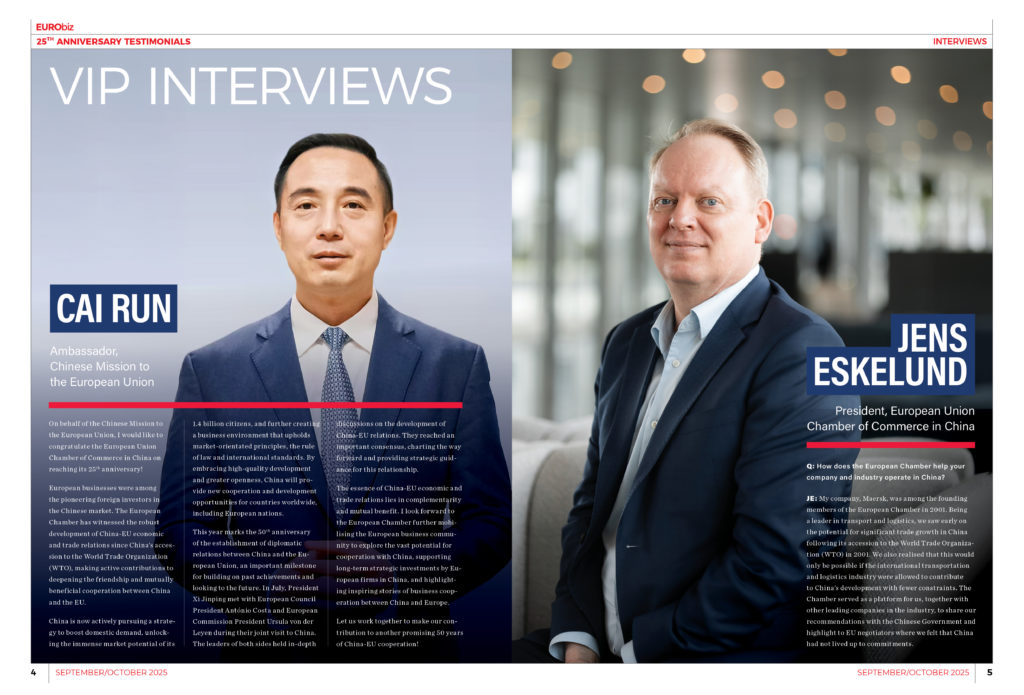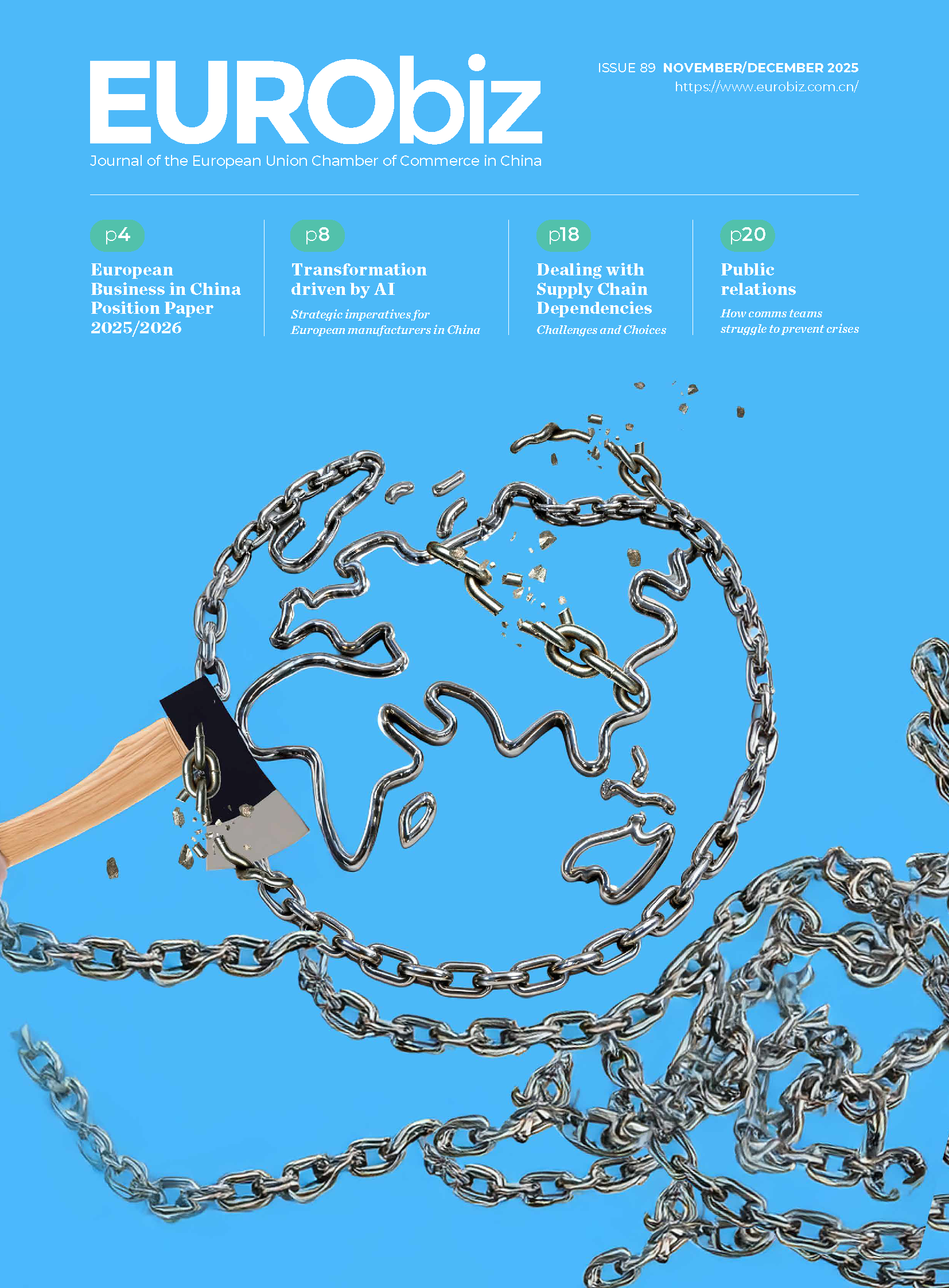
On behalf of the Chinese Mission to the European Union, I would like to congratulate the European Union Chamber of Commerce in China on reaching its 25th anniversary!

Ambassador,
Chinese Mission to the European Union
European businesses were among the pioneering foreign investors in the Chinese market. The European Chamber has witnessed the robust development of China-EU economic and trade relations since China’s accession to the World Trade Organization (WTO), making active contributions to deepening the friendship and mutually beneficial cooperation between China and the EU.
China is now actively pursuing a strategy to boost domestic demand, unlocking the immense market potential of its 1.4 billion citizens, and further creating a business environment that upholds market-orientated principles, the rule of law and international standards. By embracing high-quality development and greater openness, China will provide new cooperation and development opportunities for countries worldwide, including European nations.
This year marks the 50th anniversary of the establishment of diplomatic relations between China and the European Union, an important milestone for building on past achievements and looking to the future. In July, President Xi Jinping met with European Council President António Costa and European Commission President Ursula von der Leyen during their joint visit to China. The leaders of both sides held in-depth discussions on the development of China-EU relations. They reached an important consensus, charting the way forward and providing strategic guidance for this relationship.
The essence of China-EU economic and trade relations lies in complementarity and mutual benefit. I look forward to the European Chamber further mobilising the European business community to explore the vast potential for cooperation with China, supporting long-term strategic investments by European firms in China, and highlighting inspiring stories of business cooperation between China and Europe.
Let us work together to make our contribution to another promising 50 years of China-EU cooperation!
How does the European Chamber help your company and industry operate in China?

President,
European Union Chamber of Commerce in China
My company, Maersk, was among the founding members of the European Chamber in 2001. Being a leader in transport and logistics, we saw early on the potential for significant trade growth in China following its accession to the World Trade Organization (WTO) in 2001. We also realised that this would only be possible if the international transportation and logistics industry were allowed to contribute to China’s development with fewer constraints. The Chamber served as a platform for us, together with other leading companies in the industry, to share our recommendations with the Chinese Government and highlight to EU negotiators where we felt that China had not lived up to commitments.
In the years immediately after joining the WTO, we saw significant deregulation within our industry, which I think the Chamber can also take some credit for. This has contributed to driving down the cost of logistics in China, connecting China to international trade routes and enhancing connectivity, as well as reducing transit times. This has been a key enabler for China’s emergence as the world’s leading exporter. From a European perspective, we can take pride in European shipping and logistics companies having achieved leadership positions in China, and indeed globally.
What is the difference between China’s business/regulatory environment today versus 25 years ago, and do you expect it to change in the next decade?
Twenty-five years ago, China’s negotiations with the WTO were fairly advanced, the economy was heavily regulated, dealing with the government was complex and time consuming, and laws were generally not well adapted to the global trading system, which China would eventually join. This abruptly changed with WTO membership, which led to a rapid, and at times fundamental, transformation of China’s regulatory system. The period immediately after WTO accession saw an enormous amount of courage, creativity and sheer will to give China a modern and efficient regulatory environment. The Chamber was founded in part to navigate all these changes and to ensure that regulations would be drafted according to the letter and spirit of the WTO agreement.
China’s economy and its position in the world have changed dramatically since 2001, and so have the challenges China faces. I hope China will be able to mobilise the same courage, creativity and willpower in the coming years to address some of the fundamental issues facing its economy and trade relations.
What has been your favourite European Chamber event/experience and why?
I always enjoy the release of our publications, such as the annual Position Paper. We have access to uniquely precise and granular data through our many members, and when this treasure trove of data is analysed and shared with a wider audience, we see how some of these reports become points of reference and inform important discussions. I find it really gratifying that we can add precision and detail to discussions about the conditions for foreign businesses in China and offer fact-based suggestions as to how we, as foreign businesses in China, can thrive and contribute to development here.
How do you hope to see the Chamber develop over the next few years?
We need to fiercely safeguard our position as the independent and trustworthy voice of European business in China. The objectivity of our data and quality of our analyses must always meet the highest standards – our integrity is everything. This is at the very core. We must also continue to work on the effectiveness of our advocacy efforts. We need to pick the battles that truly matter to our members and where we can make a difference. Lastly, I am convinced that there is potential to reach new members. We exist because of our members and our members are the source of our strength. A stronger membership is a stronger chamber.
What advice would you give to the next generation of European business leaders in China?
Come to China with an open mind and immerse yourself. Learn the language, learn the history, talk to people, travel the country. Yes, there will be frustrations, but give it time and be prepared to challenge your preconceptions of how business works, and you can be sure there will be rewards to match. Doing business in China can be challenging, even frustrating, but never boring.
It is with great pleasure and pride that we can celebrate this important milestone – the 25th anniversary of the European Chamber.

Former European Commissioner for Trade (1999–2004)
Looking back a quarter of a century, I vividly recall the vision and considerable efforts we had to make to build this institution and bring it to life. At the time, I was serving as European trade commissioner and I was deeply committed to establishing a unified European voice in China, specifically in Beijing.
It was a challenging endeavour to align the various national chambers of commerce, each with their own traditions and perspectives, and to be able to do that with a common goal. I think that the Chamber stands today as a testament to this collective will, spirit and determination.
The Chamber has not only thrived, but has become an indispensable part of the European business community in China. With its comprehensive reports and advocacy, it has set a new benchmark.
Once the reports from AmCham [the American Chamber of Commerce in China] were the ones that everyone consulted, now I know for sure that it’s the European Chamber’s analysis that everyone consults, including, and this matters a lot, the Chinese authorities.
The Chamber stands as a powerful example of what Europeans can achieve when we are united and work together. So thank you to everyone at the Chamber for their hard work over the past 25 years – here’s to many more years of success.

Former European Chamber President (2011–2014) and current Overseas Representative
Dear colleagues and friends of the European Union Chamber of Commerce in China, I was one of the 51 crazy guys who founded the Chamber back in the year 2000. I still have so many memories of my time as a member and, later, president. It was a different era, a different time. I particularly remember the efforts we made to be more inclusive of smaller and new Member States’ industries. I am also proud to have launched the Chamber’s first Conference of Women Empowerment. Despite no longer being in China, I still have the privilege of joining the Brussels Tour and ensuring that the Chamber’s voice is heard in the European Union. I hope the Chamber continues to evolve. Happy 25th anniversary!
How does the European Chamber help your company and industry operate in China?

Former Chamber President (2007–2010, 2014–2017 and 2019–2023)
By analysing regulatory and policy hurdles, and formulating constructive recommendations that can help improve the economic landscape for its members, the Chamber is uniquely positioned to address national and regional decision-makers and kickstart necessary debates in the media and other public forums.
What is the difference between China’s business/regulatory environment today versus 25 years ago, and do you expect it to change in the next decade?
In the early 2000s, there was a justified optimism among European businesses about China, which was borne out of the open-minded leadership of Premier Zhu Rongji and Vice Premier Wu Yi. The dynamic they created was one of the main reasons the Chamber was established in the first place, and there was genuinely a feeling that we could move things together. The mantra ‘China can do better’, rapid urbanisation, demographics, and the country’s low base gave us the underlying economic growth pattern.
Now, China has plucked most of the low-hanging fruit and, unfortunately, displays a low appetite for further reforms. Given the local debt burden and the shrinking working population, the next decade needs energetic and visionary economic leadership once again. Can we expect that? I am sure the Chamber is more than eager to help with good ideas.
What has been your favourite European Chamber event/experience and why?
The launch of the Chamber’s first publication on Made in China 2025 in March 2017. The ballroom at the Four Seasons Hotel was packed to the rafters with journalists, and the media feedback was incredibly positive. Members across all chapters went into overdrive to discuss how to engage in China’s future. The report showcased ‘China speed’ but also warned about looming overcapacities in high-tech industries. It was a visionary publication.
How do you hope to see the Chamber develop over the next few years?
European Chamber members will face serious economic headwinds while operating in the China ‘fitness club’, with its deep bench of fantastic engineers and risk-taking entrepreneurs operating in a digital wonderland. The Chamber must continue dissecting the challenges, but also distil the opportunities. We are all in this together.
What advice would you give to the next generation of European business leaders in China?
First, beware cultural and corporate silos. Instead, remain rooted in the incredible richness of our many European cultures while benefitting from the diversity of European, international and Chinese managers. Second, as the world turns increasingly tribal and politically inward-looking, it is more important than ever to embrace the Chinese art of speed and inventiveness: this way one and one will equal 11, not two.
How does the European Chamber help your company and industry in China?

Former President (2017–2019)
The Chamber is helpful in many ways. I’d highlight the importance of the annual Position Paper. We know that the issues raised in the paper are read closely by the relevant ministries and authorities. This gives us an excellent opportunity to explain why and how certain regulatory issues impact different industries and why our suggestions for improvements should be considered.
What is the difference between China’s business/regulatory environment today versus 25 years ago, and do you expect it to change in the next decade?
Well, it’s a much more mature business and regulatory environment today than it was back then. But today, competition is fiercer than ever. And in many industries, we are experiencing destructive price wars or what we call neijuan (involution). However, we hope and believe that the Chinese Government and leadership will use modern regulation and strict reinforcement to combat the price war, guiding industry towards higher quality growth and more orderly markets.
What has been your favourite European Chamber event/experience and why?
When I was Chamber president in 2016, I led the annual Brussels tour. During the Mid-autumn Festival we were invited to the Chinese Embassy for an informal dinner. What was expected to last around one and a half hours extended well over three hours because the ambassador, Zhang Ming, had spent two days reading our Position Paper cover to cover. He asked us very detailed questions and wanted to get an in-depth understanding of our arguments.
How do you hope to see the Chamber develop over the next few years?
I think we can expect more European businesspeople to return to China in the next five years as China’s role in the global economy changes and matures, and the Chamber should continue to evolve accordingly.
What advice would you give to the next generation of European business leaders in China?
As China embarks on a path of ‘high-quality’ growth—and when it has overcome its present internal and external challenges—its economy will mature to a level where the value offered by European companies will be in even greater demand. At the same time, of course, more serious competitors will emerge. And for any global corporation that wants to stay relevant, ensuring a strong market position in China will be an absolute prerequisite.
How did the European Chamber help your company and industry operate in China?

Executive Committee Member – States’ Representative
When I first arrived in China in 2004, navigating the regulatory landscape for a design company in the construction sector felt like reading a book in a language I didn’t fully understand. Attending my first Construction Working Group meeting almost 20 years ago was an eye-opener – I sat among peers from the same sector, exchanging challenges, strategies and sometimes frustrations.
Over time, my involvement deepened: I took on different roles within the Chamber, from local initiatives in the Southwest to national-level projects. These interactions taught me as much as any formal training, helping my company comply with regulations, anticipate changes and seize opportunities.
What is the difference between China’s business/regulatory environment today versus 25 years ago, and do you expect it to change in the next decade?
Twenty five years ago, doing business in China was exciting but unpredictable. Rules were often opaque, processes slow and personal networks were critical. Today, the environment is far more structured. However, as the annual Business Confidence Survey shows, business has become increasingly politicised, creating new challenges. Looking ahead, I expect continued evolution in areas such as sustainability, digital transformation and foreign investment. Companies that remain adaptable and committed to building local trust will be best positioned to navigate these changes and remain competitive.
What has been your favourite European Chamber event/experience and why?
I have so many memories of exciting and unique experiences. Over a decade ago, I participated multiple times in the EU-China Business Summit, co-organised by the Chamber, in Beijing and in Brussels. These occasions were connected to the EU–China Partnership on Sustainable Urbanisation, where one of my company’s projects was included as part of the partnership’s pilot projects.
I had the privilege of representing the Chamber at many important moments, with some of the most formative being the missions to Brussels where we met with the European Commission, Council, Parliament and other stakeholders. These visits were crucial for advocacy, strengthening cohesion and building a sense of belonging among delegates.
More recently, as chairman of the Southwest Chapter, I had the honour of hosting—for two consecutive years—the delegation of all EU Member State ambassadors visiting Southwest China under the guidance of EU Ambassador Jorge Toledo.
Serving the Chamber in various capacities for over 18 years, including 12 years as an Executive Committee member, has been an incredibly rewarding journey. My experiences have shown me why the organisation is so effective: it bridges knowledge, fosters collaboration and creates meaningful impact.
How do you hope to see the Chamber develop over the next few years?
I foresee the Chamber continuing to strengthen its key mission as a policy advocate, providing insightful, fact-based reports and building a community for European companies in China.
Supporting sustainability, innovation and cross-border investment will remain vital.
What advice would you give to the next generation of European business leaders in China?
Be curious, patient and resilient. Take the time to understand China’s culture, people and rules – both the written and the unwritten ones. Build strong yet genuine personal relationships, and engage collaboratively with both local partners and the European community. Success rarely comes overnight, but thoughtful engagement, persistence and trust create lasting results.
How does the European Chamber help your company and industry operate in China?

Vice President
The European Chamber has long been a vital bridge between European SMEs, large enterprises and Chinese stakeholders. In the energy sector—in which regulatory clarity and long-term planning are critical—it has provided a trusted platform to voice concerns, exchange insights, and advocate for transparent and predictable rules. Through its working groups, position papers, and policy dialogues, the Chamber has helped European energy companies, including Eni, better navigate evolving policies and align their expertise with China’s climate goals, turning regulatory challenges into opportunities for partnership.
What is the difference between China’s business/regulatory environment today versus 25 years ago, and do you expect it to change in the next decade?
Twenty-five years ago, China’s business environment was defined by market opening and the first wave of foreign investment, with regulations often fragmented and inconsistently applied across regions. Today, it is far more structured and sophisticated, guided by clear national priorities in sustainability, digitalisation and energy security. Looking ahead, I expect China to further align its regulatory system with international standards, particularly in renewable energy, digital governance and carbon markets. For European energy companies, success will depend on anticipating these shifts and positioning ourselves as trusted partners in China’s transition.
What has been your favourite European Chamber event/experience and why?
Of the many Chamber activities I take part in, I attach special importance to the annual Position Paper launch. It embodies the collective voice of European business in China, offering both a diagnosis of challenges and a roadmap for solutions. In addition, this year’s high-level delegations to Brussels and Rome in February highlighted the Chamber’s critical role in linking China’s local resources with Europe’s strategic priorities. For the energy industry, these platforms are indispensable for demonstrating how European expertise can contribute to China’s decarbonisation pathway.
How do you hope to see the Chamber develop over the next few years?
I hope the Chamber will further strengthen its sustainability and energy transition leadership while fostering greater cross-industry collaboration. Energy is not an isolated sector—it is interconnected with aviation, manufacturing, digitalisation and finance. By encouraging dialogue across these areas, the Chamber can help European businesses remain competitive and relevant as they engage with China’s climate ambitions and innovation agenda.
What advice would you give to the next generation of European business leaders in China?
Be adaptive, collaborative and sustainability-driven. China is evolving rapidly, and the next decade will be shaped by the green transition and digital innovation. Cultivating cultural understanding, investing in long-term relationships and aligning business models with sustainability goals will be essential. Above all, I would urge future leaders to view China not just as a market, but as a partner in tackling global challenges – from energy transition to technological transformation.


Recent Comments